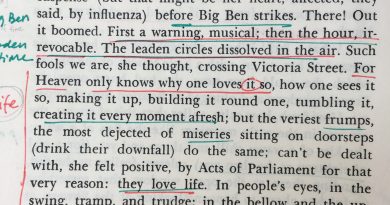On Being Creative; or, St. Romauld’s Rule

By Katie Swimm, PhD, Assistant Director of Tutoring Programs
I’ve spent most of my life making art in one way or another. My medium is theatre and the stage. I write about it, think about it, direct it, perform it, fundraise for it; sometimes I sew costumes for it. All the time I advocate for it. I believe, as many fellow theatre-makers do, that performance is one of our planet’s greatest expressions of itself. In all eras and in all places, the human race has explored its current condition by gathering in front of each other and speaking, moving, being.
So, what happens to the theatre now, in this moment of pandemic? Now, when we are made to stop gathering? When our faces and mouths – for some of us our primary means of engaging in performance – are covered? The creative community has responded to this crisis with a speed and creativity I’ve found remarkable. Theatres have immediately posted archival productions on every available platform. I was delighted to curl up last week and watch The National Theatre’s production of Sally Cookson’s Jane Eyre from the comfort of my couch. Friends with fledgling companies are doing play readings on Zoom (check out Yorick Ensemble’s Quarantine Theatre!) A past professor, with his wife, has converted their home closets to a “tiny theatre” where they do readings three times a week. Academic journals are calling for papers about Embodiment and Social Distancing. The “show” is quite literally, going on, despite restrictions on our bodies and our ability to assemble. As an artist, I am humbled to be part of this community and inspired by my friends and colleagues.
But I am overwhelmed. I don’t know how to contribute. Or how to create.
Let me be clear: I write this from a place of privilege. I have the ability to work comfortably from home. My family and friends are safe and, for the most part, healthy. I am sent multiple opportunities each week to engage in theatre digitally, to electronically connect about my scholarship, and to keep thinking about future projects over Google Hangout. But I cannot seem to find the mental or spiritual (because I think it does have to do with one’s spirit) space to be creative. I’ve talked with friends and collaborators about this for the past several weeks of quarantine… “I want to finish recording that song clip for you, but I can’t seem to get there” … “Now is the perfect time to finally submit that article…but I just want to play Words with Friends?” It takes me three days to schedule a meeting for an upcoming production I’m directing.
Last week I noticed (or, re-noticed) a print I’ve have framed and sitting on a bookshelf from the New Camaldoli Hermitage, a monastery I visited about ten years ago in Big Sur. My connection to the Catholic faith is tenuous; I was raised Methodist and attended mass at my Catholic undergrad mainly because I had a crush on one of the altar boys. But I’ve always found solace and inspiration in the quiet of a religious space, and once I started my doctoral work at Tufts, I was able to explore my interest in the many performative aspects of faith. I write, among other things, about Spiritualism and have dreamed of teaching a class in the Experimental College about Theatre and Religion.
The Camaldolese order was founded by St. Romuald in the eleventh century and embraces Eremitical asceticism: solitude, prayer, contemplation, and silence. One of the guiding principles of the Order is St. Romuald’s Brief Rule:
“Sit in your cell as in paradise. Put the whole world behind you and forget it. Watch your thoughts like a good fisherman watching for fish. The path you must follow is in the Psalms; never leave it. If you have just come to the monastery, and in spite of your good will you cannot accomplish what you want, then take every opportunity to sing the Psalms in your heart and understand them with your mind. And if your mind wanders as you read, do not give up; hurry back and apply your mind to the words once more.”
Reading Romuald’s words cracked open the puzzle of why creativity is so hard in this period. Yes, we are all coping with the realities of a global pandemic reshaping our lived experience. There have been many articles about self-care and self-compassion surrounding the notion of “being productive” during what is a traumatic experience. None of us should push ourselves to produce, publish, or perform if our focus must be on the health of our family and ourselves. Many of us want to spend our time helping those who need it the most right now – healthcare workers, the underrepresented, the sick.
If we feel the need to create, however, there is meaningful work to do in the silence and in our moments of isolation.
St. Romuald’s Rule makes it permissible to pause in this moment. He’s suggesting that perhaps the very best thing we can do is sit quietly and think about our place in the world; or, maybe in my reading, our role in any creative community. We don’t have to repurpose, repost, or make something new in order to be creative; we can be creative by letting this moment influence who we are as makers and doers. All our creative energy will find its place in the months ahead. When our communities return to “normal” (which they likely will not, entirely) there will be much to say. Like playwrights and theorists for centuries before us, essays and scripts will explore, expose, and perform this moment.
Until then, let us all take the time to sit and to think. To find our best and most creative selves in the silence we’ve been afforded right now. To use our energies to help others. Then, we’ll begin again.


